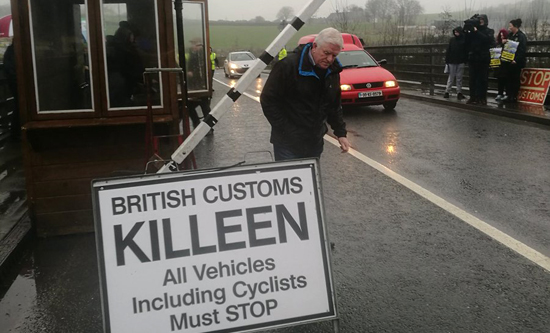
The £1bn Tory deal with the Democratic Unionist Party (DUP) cast a sharp light on splits in the British ruling class and compelled those moving against the current administration to feign shock at the politics of a party with whom they have shared the Commons benches since 1971. To Labour’s Shaun Woodward the deal was simply ‘reprehensible’. We remember that at the time of Westminster’s last hung parliament in 2010, Woodward – then shadow Secretary of State for Northern Ireland – drew up Labour’s own ‘economic package’ to coax the DUP into coalition. This time around, as Labour politicians lined up to express their newfound outrage at aspects of the DUP’s politics, claims surfaced in the press that they themselves were in discussion with DUP negotiators – heaping further pressure on Theresa May’s ‘team’ to concede on key Unionist demands.
The DUP intends to play the space between government and opposition, sidling up to Labour as necessary to increase its leverage over government. Its alliance with May remains fruitful for as long as her government’s ability to win key votes in Parliament remains precarious. Of course, this suits Labour too, making closer ties with the DUP an attractive prospect. And so off went Labour’s Owen Smith to join in with Orange Order festivities in Belfast – the new shadow Secretary of State for Northern Ireland celebrating loyalist supremacy on the Twelfth. Truly reprehensible.
Contrary to the haughty proclamations of the British press, subjecting the DUP to media scrutiny will not drag the backward ‘provincials’ through a mini-enlightenment. Unionism cannot exist without the politics of supremacy. At Unionism’s root is British imperialism and the partition of Ireland – it is Frankenstein’s monster; the DUP just one monstrous face. All Britain’s major parties are Unionist parties and their commitment to anti-Irish reaction goes far beyond ‘grubby deals’ in Westminster.
Devil in the detail
Back in the Six Counties, the reality of the £1 billion-plus Tory-DUP deal – with the lion’s share funnelled straight into the hands of capital through infrastructure and ‘enterprise’ projects – is utterly removed from the British media hyperbole. Far from improving the lives of the working class in the north of Ireland, the deal merely shores up the current dispensation: a sectarian statelet governed by corruption and violence; growing poverty; health and education systems pushed ever-deeper into crisis.
Of the £300m allocated to health, while two-thirds of it is for ‘health care reform’, much of the rest will be parcelled out to private health care firms tasked with addressing ‘immediate pressures’ facing hospitals in the north. This scam is the recurring ‘solution’ to the hospital waiting list crisis in the Six Counties – a process begun in 2005 by none other than Shaun Woodward during his stint as the Northern Ireland Office Health Minister, in those heady days of direct rule by a British Labour government. The Royal College of Nursing rightly called the money for waiting list reduction ‘a drop in the ocean’. The same is true of the £50m to firefight those other ‘immediate pressures’ in education. As for the money ‘targeting areas of severe deprivation’, this is merely a euphemism for the same old slush funds of which loyalist paramilitaries – through their ‘community organisations’ – have long availed themselves. The claim by Jeremy Corbyn and others that austerity has ended for ‘Northern Ireland’ is insulting.
Brexit, the border and the DUP
While the Irish dimension is prominent in the current phase of Brexit talks, it is the issue of the Customs Union – a subject of the upcoming ‘second phase’ negotiations – that looms largest over Ireland.
The deal with the DUP brought increased attention to that party’s stated opposition to reviving a ‘hard border’ along the Irish partition. The media’s fixation with this reflects the manoeuvring of the majority of the British ruling class who want excuses to put the Brexit brakes on.
The problem is this: whilst ‘opposing’ a hard border in Ireland, the DUP also opposes the alternative, whereby similar controls are operated between Ireland and Britain at seaports and airports. Introducing neither means the ‘United Kingdom’ remaining in the Customs Union…an option to which the DUP is also opposed. So just how is that circle to be squared? It can’t be – as the EU could not allow it. What is more, they all know this. Should the British quit the Customs Union, the Twenty-Six County state will be compelled to administer some form of ‘hard’ customs border. Regardless of precisely where it lies and the technology used, however ‘creative’ and ‘innovative’ it is, it will be neither invisible nor ‘frictionless’. The inevitable disruption of negotiating custom controls will help wreck the north’s economy and the island’s ailing agriculture. Any tariffs imposed on agricultural goods will be devastating – the all-island agri-food industry is highly integrated, with products passing back and forth across the partition at different stages of production. Having finally won the devolved powers needed to slash the north’s corporate tax rate in a bid to lure foreign investment, a post-Brexit Six Counties outside the Customs Union becomes an unattractive prospect to foreign capital wanting access to European markets.
Yet the DUP remains a pro-Brexit party. Why? In 2016 a broad swathe of Unionism sided with the Eurosceptic fringe of the British ruling class. It did so because the decline of British imperialism and the attendant rationing of privilege meant sections of Unionism were prepared to bite the bullet and back desperate measures in pursuit of their sectional interests. That is why the DUP is loath to see the spectre of a hard border scupper Brexit. Victim of its own jaundiced world outlook, it harbours illusions that as world capitalism descends further into crisis Britain can somehow defend its interests as an independent power. It is mistaken. It is aboard a sinking ship.
Patrick Casey
Fight Racism! Fight Imperialism! 259 August/September 2017




